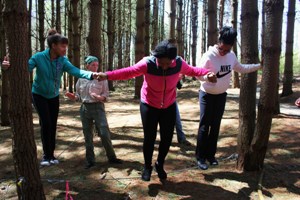April 10th 2013
"What gives value to travel is fear. It is a fact, at a certain moment, when we are far from our own country we are seized by a vague fear, and an instinctive desire to go back to the protection of old habits. This is the most obvious benefit of travel. At that moment we are feverish but also porous, so that the slightest touch makes us quiver to the depths of our being. We come across a cascade of light, and there is eternity. This is why we should not say that we travel for pleasure." - Albert Camus

That may read a bit severe to some of us, but I think Monsieur Albert speaks of the essence of trekking. I recall several years ago when
Trekkers were on their annual spring break expedition, a trip full of early morning wake ups to make the most of our six days in the Florida Everglades. After several days of 6:00 AM starts one the students made it clear to me this wasn't his idea of a vacation; ha! I remember my quick unfiltered response: "Traveling with fifteen teenagers isn't my idea of a vacation either!” The point was made.
Over the years we have learned how to make the trek more about the experience than the place. It begins in the planning, the budget, itinerary, menu, permission forms, waivers, medical forms, and lots of other details that are the obvious. But a sixteen hundred mile, six day trip on the trekker bus to Asheville, North Carolina for spring break with nineteen students and leaders requires a few tricks of the trade. Timing is key. Noticing when energy levels need a boost on long bus trips allows us to break out "DJ J-Dawg" (aka Julia VanderWoude, our Expedition Assistant) to play a pre- selected set of tunes dedicated to individual students. This never fails to re-energize a bus load of students towards the final leg of a long journey.
Morning devotions help set the tone for the day. They’re followed by our mood checks, on a scale of 1 -10, this helps us to be pro-active with knowing who's up and who's down. Our covenant requires trekkers to travel unplugged, no cell phones, no electronics except cameras. We want our students to be in the moment, to take in all that surrounds them...no talk of tomorrow when we are still in today. Bathroom breaks on a 1-10 scale (I'm at a 5 equals 30 minutes... you would never wait to announce when you are at an 8 or 9, which would be trouble.) allow for plenty of time to find a bus-friendly place to park the oversized vehicle.
Everyone wears a whistle with a known protocol on use, and a buddy system, point person, and sweep all help to insure safe travel as we journey on trails and city streets. Trekkers carry filled water bottles to ensure hydration, this and healthy meals, and good night's sleep help to create a positive energy throughout the trip. We also do our best to make sure everyone is good and tired by day's end so sleep comes quickly.
Reflecting back on a quote from one of my former students, Jose, I think he sums it up:
"...I use to think that Trekkers was only about amazing views and experiences. I never thought that Trekkers was about the lessons of life." Our students have come to recognize the value of the way we travel on Trekker trips. Don’t get me wrong, sometimes it’s difficult to get them out of bed at 6:00 am. But when they see the intentionality in the art of the road trip, they begin to see the merit of conscious attention to their surroundings, their peers, and their own sense of being.

